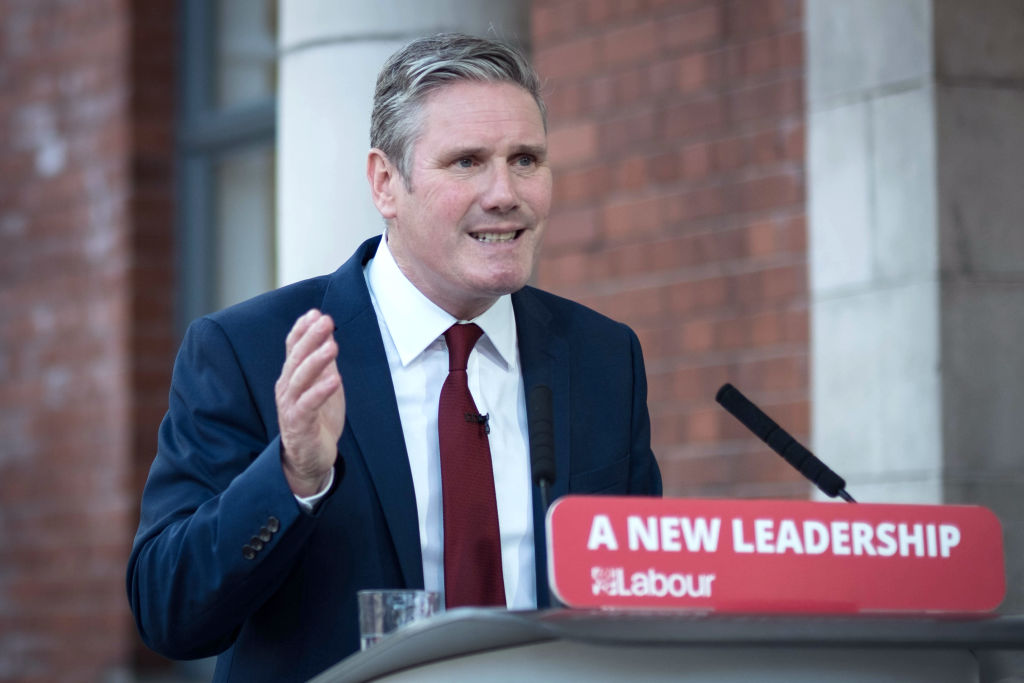Keir Starmer’s first conference speech as Labour leader took place in exceptional circumstances. Thanks to Covid, there was no party conference in the conventional sense. His speech lacked the usual enthusiastic audience primed to punctuate a leader’s rhetoric with cheers; nor was there a ten-minute-long standing ovation at its conclusion. It was a desperately low-key event.
If the lack of conventional theatrics made the speech unique, Starmer’s address was in terms of substance exactly what we might expect from the leader of a party which has suffered four successive defeats, especially as the last one was Labour’s worst since 1935. For Starmer’s main theme was – other than criticism of the government’s handling of the Covid crisis – that Labour had changed. His podium even carried the legend ‘A New Leadership’ to indicate in as clear terms as possible that the party was, as he put it in one Prime Minister’s Questions, under ‘new management’.
I am presenting a Radio 4 Archive Hour documentary in November which looks at how parties in the past have responded to the kind of dire position in which Labour found itself on the morning of Friday 13th December 2019. And I can tell you that all parties suffering a cataclysmic electoral defeat, or a series of cumulative reverses, have each faced the same deceptively simple over-riding imperative: to persuade those who did not vote for them that they have changed.
There are however only a few ways in which a political party can do this. After their dramatic drubbing in 1945, Conservatives debated altering their party’s name; so did Labour after it suffered its third defeat in a row in 1959. But, ultimately, they both fought shy of such a desperate measure. Even Tony Blair didn’t formally alter his party’s name after its fourth defeat in a row in 1992: he just added that vital adjective, ‘New’.
Parties more usually replace their defeated leader with a fresh face, something Labour did after its 1983 disaster just like the Conservatives after losing their fourth election out of five in October 1974 and again after Blair’s 1997 landslide. But substantive policy changes – and even revisions to ideology – will by necessity follow if this quick fix fails to impress the right kind of voter, something which it usually does not – just ask William Hague.
But at the same time as parties try to show voters they have changed, their new leader needs to reassure their members that, actually, they haven’t changed that much. It is a tricky balancing act, as Neil Kinnock found.
In resolving that paradox, Starmer’s difficulties are more acute than for most previous leaders. For when Labour members turned to him in the spring, nearly two-thirds still thought Corbyn had done a good job, with the vast majority thinking most of the policies Labour outlined in 2019 should be retained. So while indicating the manifesto was ‘overloaded’ Starmer said nothing about which policies he would unload; and since becoming leader he has kept his own counsel on that matter.
In his speech, Starmer tried to overcome that dilemma, largely thanks to Covid. In emphasising change – to those Red Wall voters who have progressively abandoned Labour over a number of elections – he began and ended his speech by referring to his patriotism, indeed he claimed it was love of country that inspired him to want to improve Britain. It is tempting to suggest that his references to patriotism had taken the place of Corbyn’s talk of socialism, which Starmer did not mention once. If this perturbed some in his party they might however have been reassured by his promise that whatever Labour presented to voters at the next election ‘will be rooted in Labour values’.
Starmer’s reference to the Covid crisis was telling and shows how he will justify policy change when it finally comes. Covid, he said, had created new priorities to such an extent even 2019 was now ‘ancient history’; it meant that whatever the party said at the next election ‘will not sound like anything you’ve heard before’. This creates the grounds for some big changes in the future. And, in the same way Harold Wilson used the scientific revolution in the 1960s and Blair globalisation in the 1990s as external forces to which Labour must adapt or die so Starmer is using Covid to convince members that change is unavoidable.
At the end of his speech, Starmer invited doubting voters to ‘take another look at Labour’. How many will take the time to do this in the midst of Covid disruptions and how many of those will be convinced Labour has changed under his leadership, only time will tell. Certainly, the Conservatives are doing their best to claim Starmer marks no change from Corbyn.
The past is littered with party leaders who failed to convince voters they had changed their parties. It is likely that warm words about patriotism from a new leader will only take Labour so far. At some point the hard – and divisive work – of itemising what precisely needs to be unloaded from Labour’s 2019 manifesto will have to begin. No party has yet bounced back from defeat without it.
Steven Fielding is professor of political history at the University of Nottingham and is writing ‘The Labour Party: from Callaghan to Starmer’ for Polity Press. On Twitter he is @PolProfSteve






Comments